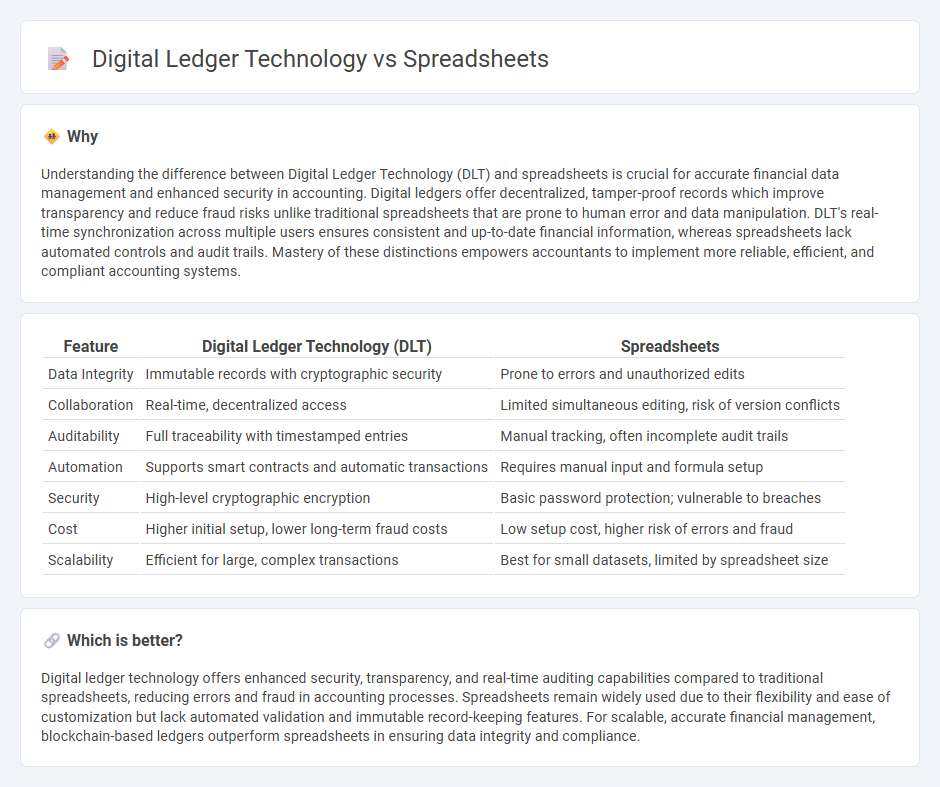
Digital ledger technology offers enhanced security, real-time updates, and decentralized data management compared to traditional spreadsheets, which are prone to errors and lack transparency. While spreadsheets remain widely used for basic accounting tasks due to their simplicity, digital ledgers provide superior accuracy and auditability essential for modern financial operations. Explore how these tools can transform your accounting processes for greater efficiency and reliability.
Why it is important
Understanding the difference between Digital Ledger Technology (DLT) and spreadsheets is crucial for accurate financial data management and enhanced security in accounting. Digital ledgers offer decentralized, tamper-proof records which improve transparency and reduce fraud risks unlike traditional spreadsheets that are prone to human error and data manipulation. DLT's real-time synchronization across multiple users ensures consistent and up-to-date financial information, whereas spreadsheets lack automated controls and audit trails. Mastery of these distinctions empowers accountants to implement more reliable, efficient, and compliant accounting systems.
Comparison Table
| Feature | Digital Ledger Technology (DLT) | Spreadsheets |
|---|---|---|
| Data Integrity | Immutable records with cryptographic security | Prone to errors and unauthorized edits |
| Collaboration | Real-time, decentralized access | Limited simultaneous editing, risk of version conflicts |
| Auditability | Full traceability with timestamped entries | Manual tracking, often incomplete audit trails |
| Automation | Supports smart contracts and automatic transactions | Requires manual input and formula setup |
| Security | High-level cryptographic encryption | Basic password protection; vulnerable to breaches |
| Cost | Higher initial setup, lower long-term fraud costs | Low setup cost, higher risk of errors and fraud |
| Scalability | Efficient for large, complex transactions | Best for small datasets, limited by spreadsheet size |
Which is better?
Digital ledger technology offers enhanced security, transparency, and real-time auditing capabilities compared to traditional spreadsheets, reducing errors and fraud in accounting processes. Spreadsheets remain widely used due to their flexibility and ease of customization but lack automated validation and immutable record-keeping features. For scalable, accurate financial management, blockchain-based ledgers outperform spreadsheets in ensuring data integrity and compliance.
Connection
Digital ledger technology enhances traditional accounting by providing a secure, decentralized platform for recording transactions, ensuring data integrity and real-time updates. Spreadsheets serve as an accessible tool for organizing, analyzing, and visualizing financial data, facilitating the interpretation of ledger entries. Combining digital ledgers with spreadsheets enables seamless data management, improved accuracy, and streamlined financial reporting.
Key Terms
Data Entry
Spreadsheets offer straightforward data entry but are prone to human error, lack real-time updates, and have limited security features compared to digital ledger technology (DLT). DLT ensures immutability, decentralization, and automated validation of entries, enhancing data integrity and traceability. Explore how digital ledger technology can revolutionize your data entry processes for accuracy and transparency.
Automation
Spreadsheets provide manual data entry and basic formula automation, limiting their efficiency in handling complex transactions or real-time updates. Digital ledger technology (DLT), such as blockchain, automates transaction verification and enhances data security through decentralized consensus mechanisms. Explore how DLT revolutionizes automation compared to traditional spreadsheets for deeper insights.
Immutable Record
Spreadsheets provide a familiar way to organize data but lack an immutable record, making them susceptible to alterations and errors. Digital ledger technology, such as blockchain, ensures data integrity through decentralized consensus and cryptographic security, creating tamper-proof and permanent records. Explore how immutable digital ledgers revolutionize data trust and transparency in your systems.
Source and External Links
Spreadsheet - Wikipedia - A spreadsheet is a computer application for data computation, organization, analysis, and storage in tabular form, allowing users to enter numeric or text data and create formulas for automatic calculations, widely used in business for various tasks from accounting to data analysis.
Google Sheets: Online Spreadsheets & Templates - Google Sheets provides online collaborative spreadsheets with AI-powered features like automatic formatting, analysis, and formula generation to help users manage and visualize data effectively from any device.
Google Sheets on the App Store - The Google Sheets app enables creating, editing, and collaborating on spreadsheets in real-time across devices, including offline access, automatic saving, and integration with Excel files.
 dowidth.com
dowidth.com